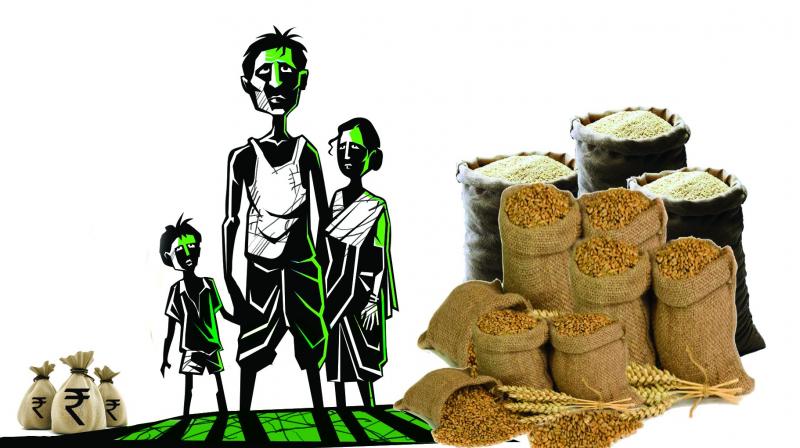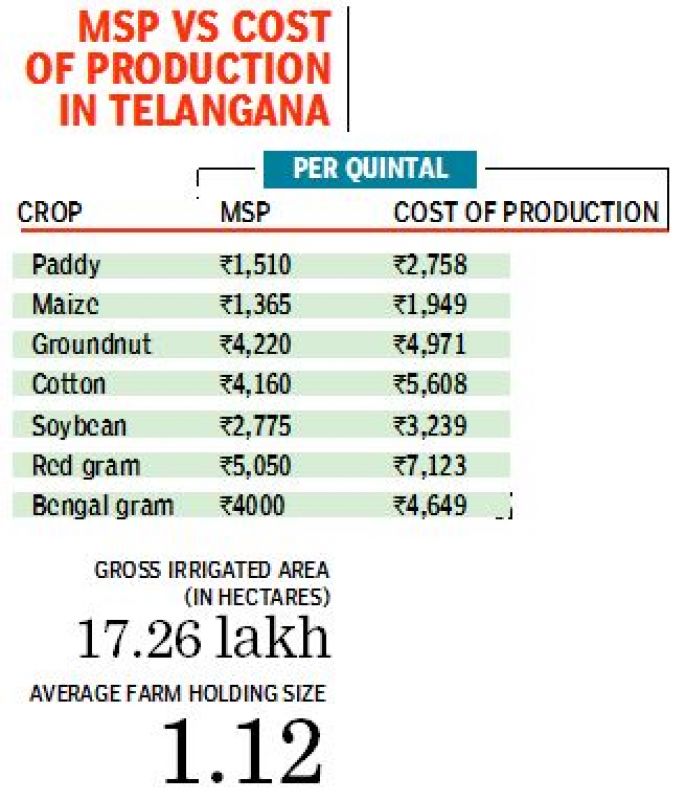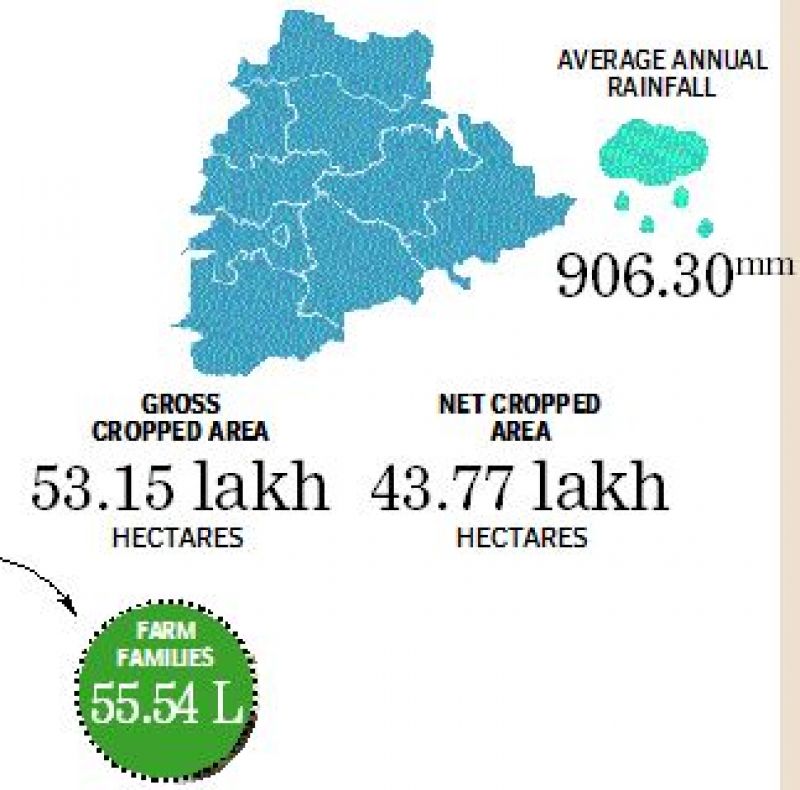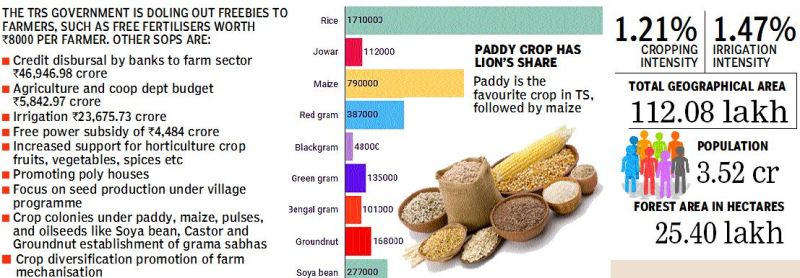MSP offers little support to farmers

Hyderabad: Farmers’ woes in Telangana and across the country seem unending due to both manmade disasters and natural calamities, making agriculture a big gamble. The crux of the problem is lack of the recommended 50 per cent profit on agricultural produce, a fixed rate for crops before harvest, facilities for storage and marketing, value addition, assured purchases, and of traders and commission agents deciding on prices and enforcing their will on hapless farmers, besides erratic weather.
Food grains and vegetables are the only commodities for which prices are fixed by traders and not by those who produce them – the farmers.
The National Commission on Farmers (NCF) headed by agricultural scientist M.S. Swaminathan had made several recommendations to improve the lot of the farmers, including a call to fix Minimum Support Price (MSP) for crops at levels of “at least 50 per cent more than the weighted average cost of production.” These had been listed in the BJP’s 2014 Lok Sabha election manifesto and backed by every party in the Opposition including Congress.
As per the recommendations, farmers should get returns in the ratio of 1:1.5; or a Rs 100 investment should fetch Rs 150; or a 50 per cent profit. Though the recommendations were made in 2007, this has not been acted upon by the governments.
If one looks at the MSPs of select crops in 2016-2017, approved by the cabinet committee on economic affairs (CCEA) chaired by Prime Minister Narendra Modi, based on estimated production costs, the Swaminathan formula remains a mirage. The existing MSP is a small financial support to farmers in case of a glut in the market and is far less than the actual cost of crop production.
MSP is based on the recommendations of the commission for agricultural costs and prices, which takes into account the cost of production, overall demand-supply, domestic and international prices, inter crop price parity, terms of trade between agricultural and non-agricultural sectors, and the likely effect on the price policy on the rest of economy, besides ensuring rational utilisation of production resources like land and water.
Though there are 140 odd crops in Telangana, grown during Kharif and Yasangi (Rabi), the Centre had fixed MSP for only 18 crops in the country like paddy, cotton, maize, soya bean, red gram, black gram, green gram, bengal gram, groundnut, sunflower, bajra, jowar-hybrid, jowar-maladandi, ragi, sesamum, safflower and sugarcane.
After the debt trap that led to mass suicides in 2003-2005 and earlier, nature’s fury, poor quality of seeds, fertilizers etc, un-remunerative prices since the past few years, farmers are facing now less distress due to good rain; and in 2016 were hooked to chillies. With no remunerative price or MSP, all hell broke loose in Telangana and Andhra Pradesh this season as tonnes of chillies arrived in the market with fewer buyers.
Traders fixed Rs 1,000 to Rs 6,000 as price for a quintal of chilli, depending on variety, compared to the Rs 10,000 for quality ones last year, lea-ding to protests from farmers and opposition parties. The Khammam market yard was attacked, and farmers set fire to chillies in other parts of the state, forcing the Centre to intervene. Former civil supplies minister in undivided AP and a progressive farmer, C. Muthyam Reddy, calls chillies and cotton “dangerous and risky” crops, which can make or mar a farmer’s life.
“Chillies and cotton are risky. We need to be careful with such corps. In view of good monsoon, everyone hooked on to it. Farmers should not bank on one crop but go for multiple crops. Where there is no MSP, state should give a bonus,” Mr Reddy told this newspaper.
Asked how to end the agrarian crisis, he says it needs manifold action like proper soil testing, recommend weather suitable crops since we have three climatic zones, quality power, water, seeds, pesticides, timely credit, harvesting technologies, storage facilities, marketing facilities, an easy crop insurance scheme, and making facility for farm produce in ways as to take it to consumers at affordable rates and ensuring sufficient profit to farmers. A snap in the chain and inclement we-ather can destroy farmers.
Mr Reddy raises paddy, chillis, cotton, soya, tomato and other crops. “Farmers should go for multiple crops, not just one, to avoid risks,” he suggests.
In the matter of chillies, it came down from 1,05,000 hectares in 2014-2015 to 61,000 hectares in 2015-16 and shot up to 1,12,000 hectares in 2016-17. Among several varieties of chillies, Teja is popular and fetches Rs 6,000 to Rs 6,500 per quintal.
Unlike paddy and some other crops, no MSP has been fixed by the Centre for chillies, a commercial crop. MSP is a price fixed by the Centre to offset a loss to some extent in case of a glut in the market but this doesn’t provide a profitable price to farmer.
The total chilli production is a record seven lakh metric tonnes compared to 3,17,000 MTs in 2014-15 and 2,07,000 in 2015-16. As markets were engulfed with chillies and prices crashed leading to protests, the state and the Centre indulged in a blame game. Union minister Venkaiah Naidu says agriculture is a state subject while the TRS government wanted the Centre to fix MSP for all crops since crops are traded nationally and the state cannot fix MSP.
Irrigation minister T. Harish Rao slams the Centre for fixing Rs 5,000 per quintal for chillies under MIS when the state sought Rs 7,000 per quintal. “Chilli production touches 7 lakh metric tonnes this season. Union agriculture minister Radha Mohan Singh’s decision to buy 33,700 metric tonnes of chilli from Telangana is ridiculous. Farmers are getting Rs 5,500 to Rs 6,000 for Teja and other good variety chillies. What is the relief to farmer,” he asks.
The Congress ruled the Centre for 60 years and NDA and others for 10 years but they did not fix MSP for chilli, turmeric and many other crops.
Ever since Chief Minister K. Chandrasekhar Rao took over the reins of the state in 2014, the TRS government took several pro-farmer steps. In view of the record sowing of paddy over 22 lakh acres and production of 60 lakh metric tonnes, the Telangana government opened 3,000 purchase centres, for which MSP has been fixed at Rs 1,500 per quintal. But Chengalreddy Peddireddy, secretary of the General of Consortium of Indian Farmers Associati-ons (CIFA) is critical of the state of affairs and wants a referendum on farmers’ issues. In a post on Facebook, he says, “The nation needs to be awakened from the slumber. The fruits of development are mostly cornered by the organised sector. Farmers have become slaves. They have no economic equity or social recognition. The only right is right to vote.”
Telugu Rythu Sangham president P Janga Reddy demands a payment of Rs 10,000 per quintal for farm produces.




